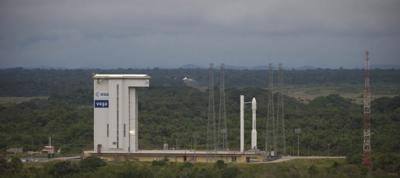Tue, Jan 31, 2012
Launch Window Opens February 9th
ESA’s new Vega rocket is now fully assembled on its launch
pad. Final preparations are in full swing for the rocket’s
inaugural flight from Europe’s Spaceport. The launch window
opens on February 9th. The upper composite, comprising LARES,
ALMASat-1, seven CubeSats, the payload adapter and the fairing, was
moved to the pad late Monday night. A night transfer is the
standard practice in Kourou to avoid overheating the payloads.

The move ended early Tuesday morning with its installation on
the dedicated stand inside the mobile gantry to await mating with
the launcher. The composite was then added on top of Vega’s
AVUM fourth stage to finalise electrical connections and verify
links, concluding with the final mechanical connection.
The main remaining steps to the maiden flight are the final
checkout of the assembled vehicle, the full launch countdown
rehearsal and the fuelling of the restartable AVUM.
This first flight, dubbed VV01, marks the end of nine years of
development by ESA and its partners, Italian space agency ASI,
French space agency CNES and industry. It will lift off from the
new Vega launch site at Europe’s Spaceport in Kourou, French
Guiana, carrying nine satellites into orbit. The launch window
opens on February 9 and ends a few days later. The mission will
qualify the overall Vega system, including the vehicle, the ground
infrastructure and operations from the launch campaign to the
payload separation and disposal of the upper module. In particular,
it will demonstrate the vehicle’s performances and payload
services in flight.
Vega will provide Europe with a safe, reliable and competitive
capacity to carry science and Earth observation satellites into
orbit, while perfectly complementing the heavy Ariane 5 and medium
Soyuz rockets already launched from the spaceport. The rocket is
designed to cope with a wide range of missions and payload
configurations in order to respond to different market
opportunities and provide great flexibility.
Unlike most small launchers, Vega is able to place multiple
payloads into orbit. In particular, it offers configurations able
to handle payloads ranging from a single satellite up to one main
satellite plus six microsatellites. It is compatible with payload
masses ranging from 660 to 5,500 pounds, depending on the type and
altitude of the orbit required by the customers. The benchmark is a
3,300 pound payload into a 435 mile-altitude polar orbit.
More News
Aero Linx: International Federation of Airworthiness (IFA) We aim to be the most internationally respected independent authority on the subject of Airworthiness. IFA uniquely combi>[...]
Ultrahigh Frequency (UHF) The frequency band between 300 and 3,000 MHz. The bank of radio frequencies used for military air/ground voice communications. In some instances this may >[...]
A Few Questions AND Answers To Help You Get MORE Out of ANN! 1) I forgot my password. How do I find it? 1) Easy... click here and give us your e-mail address--we'll send it to you >[...]
From 2019 (YouTube Edition): Learning To Paint Without Getting Any On Your Hands PPG's Aerospace Coatings Academy is a tool designed to teach everything one needs to know about all>[...]
Also: Sustainable Aircraft Test Put Aside, More Falcon 9 Ops, Wyoming ANG Rescue, Oreo Cookie Into Orbit Joby Aviation has reason to celebrate, recently completing its first full t>[...]
 ANN's Daily Aero-Linx (05.06.25)
ANN's Daily Aero-Linx (05.06.25) ANN's Daily Aero-Term (05.06.25): Ultrahigh Frequency (UHF)
ANN's Daily Aero-Term (05.06.25): Ultrahigh Frequency (UHF) ANN FAQ: Q&A 101
ANN FAQ: Q&A 101 Classic Aero-TV: Virtual Reality Painting--PPG Leverages Technology for Training
Classic Aero-TV: Virtual Reality Painting--PPG Leverages Technology for Training Airborne 05.02.25: Joby Crewed Milestone, Diamond Club, Canadian Pilot Insurance
Airborne 05.02.25: Joby Crewed Milestone, Diamond Club, Canadian Pilot Insurance



